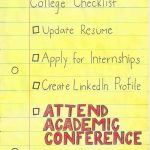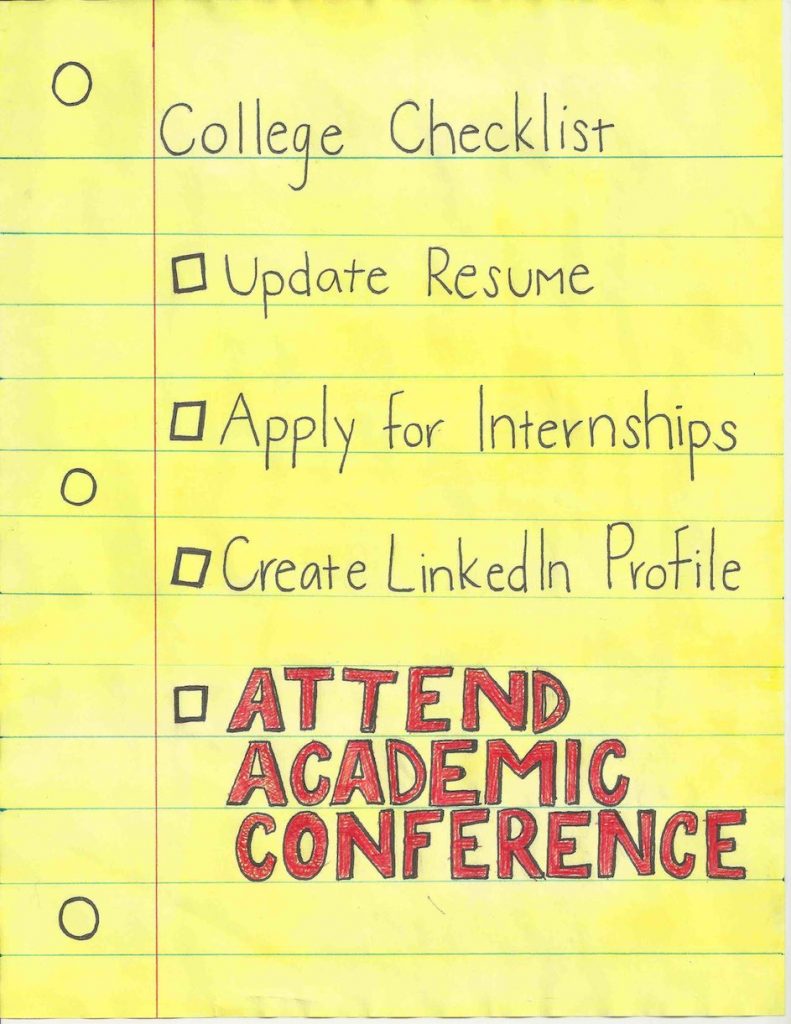The Value of Academic Conferences for Undergrads
On April 13th, I drove four hours and 185 miles up to Vancouver, BC for the 2016 Salish Sea Ecosystem Conference. I was invited to this three-day event by Jeff Rice, managing editor at the Puget Sound Institute and the supervisor of my editorial assistant internship. I was tasked with attending sessions about plastics and citizen science and trying to sniff out any compelling stories among all the scientific data.
While I did discover many promising story leads, I also discovered something absolutely essential to my future—I uncovered the mystery of what graduate students do.
I had a vague idea going in. Grad students do research. But that was the extent of my knowledge. What kind of research did they do? What did they do with their research? Who did they do research with? Was I cut out for doing research or was that level of rigorous science far beyond my skills and abilities? These questions I had no answers to.
This conference alleviated most, if not all, of my post-bachelor-degree trepidations. There were multiple sessions on a number of topics, and within each session were anywhere from four to six presentations. Each presentation was unique but at the core they were quite similar. The presenter gave a bit of background on his or her subject, stated the research question they were trying to answer, described the design of the experiment or study, and then presented the results with an analysis. Most presenters wrapped up with a statement on what questions remained unanswered and then took questions from the audience.
That was it. And by “it” I don’t mean to trivialize the massive amount of work these researchers underwent. I mean that each of these presentations was a perfect analogy for what the post-bachelor student does. The background and literature review is your undergrad major, in which you spend four years learning the fundamentals and reviewing a lot of literature (in the form of textbooks). The hypothesis formation is akin to choosing your graduate school program.
At that point, the analogies begin to merge. Once a hypothesis has been formulated, an experiment is designed. In grad school, these experiments are lead by faculty with students as researchers. When the experiment is over, the results are analyzed and presented, either at an academic conference such as the one I was at or as your master’s thesis/doctoral dissertation. These results, as well as the experiment itself, are questioned by the audience, which, in grad school, would be your academic peers reviewing your work for publication. If accepted by the scientific community, the questions that remain unanswered are opportunities for further research, which to a grad student means “potential jobs.”
The clouds of uncertainty parted and I finally understood what lay before me if I chose to go to graduate school. But there were even more lessons to be learned.
Naturally, some presentations interested me more than others. But the ones I found particularly compelling surprised me. Kyle Antonelis, vice president of Natural Resources Consultancy Inc., presented the results of his experiment to determine which of six crab pot designs resulted in maximum crab escapes when the pot was lost at sea. Similar to this was a presentation by Joan Drinkwin, programs director of the Northwest Straits Foundation, who described her team’s successful removal of 5500 lost fishing nets. I have no background or interest in recreational fishing, so at first I was confused as to why these particular studies so fascinated me.
After further reflection, I decided these presentations were appealing to me for two different reasons. In the case of the first study, I loved the way it was set up. There were six different crab pot designs, each were put into the same conditions, and the number of crab escapes were recorded. Afterwards, Antonelis and his team decided what it was about the winning design that was so successful. As it turns out, the type of door and the placement of the door were the two pivotal features. The simplicity of the research question and the relative ease of answering it didn’t reflect the value of the information acquired. Or, in other words, an experiment doesn’t have to be intimidatingly complex to be supremely useful. This is a lesson all undergrads should learn.
The second study appealed to me because it was so helpful. Drinkwin and her team removed 92% of a reported 6,000 lost fishing nets. This didn’t sound like an experiment. In my mind, experiments cost a bunch of money, generate valuable knowledge, and then require even more money to implement the knowledge they generated. Joan Drinkwin’s presentation showed me that data and knowledge can be generated whilst improving conditions, not just as a precursor to doing so.
Lastly, I underestimated how much you can learn when placed in a room with your peers. The mentor I was paired up with (the fantastic Susan Meyer of the EPA) shared her regrets at not getting a Master’s degree earlier and told me that I should take my GRE no matter what I decide, since they are good for five years. Fellow UW students who attended the conference recommended that I use my upcoming summer internship as my senior capstone and they assured me that I could still get a UPASS, despite declining one when I registered on the 11th. Thanks to their advice, I contacted my academic advisor and am well on my way.
To be fair, this was not my first conference. In October of 2015, I went to a journalism conference in Austin, TX. Although I learned many tips and tricks that have improved my writing (hopefully), I am not planning an academic career in journalism. Therefore, I took something different away from that experience than I did from this one. However, I see now that whatever your major, professional conferences are a must. They can give you an idea of what can come next, how to prepare, and who your colleagues might be.
I was sent to this conference to look for emerging stories in the realm of environmental science. But what I found was a preview of what may be in days to come, if I so desire. With familiarity comes confidence. I feel better about my decision to go to grad school and more informed as to what kind of research projects would fit me well. Mysteries were solved and myths were busted. Furthermore, I found that there are hundreds of colleagues and peers who have walked this trail ahead of me, and there’s no shortage of guides willing to lead the way.







